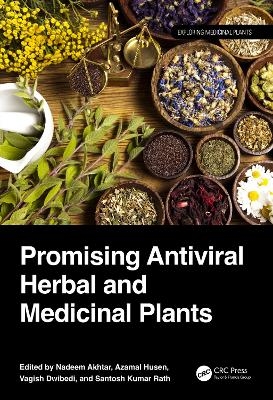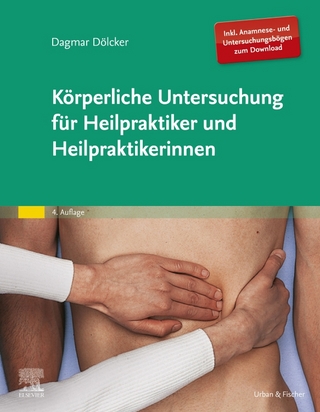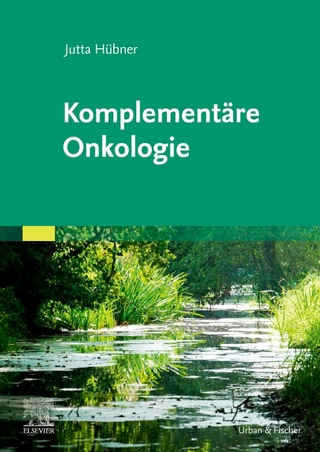
Promising Antiviral Herbal and Medicinal Plants
CRC Press (Verlag)
978-1-032-35880-2 (ISBN)
With the prevalence of viral diseases causing significant health challenges and the emergence of highly infectious and difficult-to-treat conditions, such as Ebola, HIV/AIDS, and Hepatitis B, there is a pressing need for effective antiviral treatments. Throughout history, viral infections have caused devastating pandemics, leading to widespread illness and mortality. Notable examples include the Black Death caused by Yersinia pestis and the Spanish flu pandemic of 1918. To address this ongoing threat, exploring the potential of herbal and medicinal plants as a source of antiviral compounds is crucial. Promising Antiviral Herbal and Medicinal Plants provides a comprehensive overview of the latest research in the field of antiviral properties of herbal and medicinal plants.
Features:
Compiles cutting-edge research on the antiviral properties of various plants, highlighting their potential therapeutic applications
Discusses various chemical components of the medicinal and herbal plants with the known bioactive constituents and their antiviral applications
Elaborates on medicinal and herbal plants' opportunities and future direction for drug synthesis against various viral diseases
A volume in the Exploring Medicinal Plants series, this book is an essential resource for researchers, healthcare professionals, and those interested in viral infections and their management.
Nadeem Akhtar was a Research Associate at the University of Guelph, Canada, where the objective of his work was to to improve companion animals' health in order to promote a superior and more health-conscious lifestyle. Prior to assuming this position, he worked as a postdoctoral researcher at the Department of Chemical Engineering, University of Waterloo, Canada (2019–2021), and the Department of Animal Biosciences, University of Guelph, Canada (2015–2019). Dr. Akhtar was awarded a Ph.D. from the Department of Biotechnology, Thapar Institute of Engineering and Technology, India. Azamal Husen (MSc from Hamdard University, New Delhi, and PhD from Forest Research Institute, Dehra Dun, India) is a Foreign Delegate at Wolaita Sodo University, Wolaita, Ethiopia. He has served the University of Gondar, Ethiopia, as a Full Professor of Biology, and worked there as the Coordinator of the MSc Program and as the Head of the Department of Biology. He was a Visiting Faculty member of the Forest Research Institute, and the Doon College of Agriculture and Forest at Dehra Dun, India. He has more than 20 years’ experience of teaching, research, and administration. Dr Husen specializes in biogenic nanomaterial fabrication and application, plant responses to nanomaterials, plant adaptation to harsh environments at the physiological, biochemical, and molecular levels, herbal medicine, and clonal propagation for improvement of tree species. He has conducted several research projects sponsored by various funding agencies, including the World Bank, the Indian Council of Agriculture Research (ICAR), the Indian Council of Forest Research Education (ICFRE), and the Japan Bank for International Cooperation (JBIC). Vagish Dwibedi did his B.Sc from Lucknow University, Lucknow, Uttar Pradesh, and Ph.D. from Thapar Institute of Engineering and Technology, Patiala, India. Dr. Dwibedi is an academician and researcher with more than eight years of experience in biotech research and development. He has carried out research projects and consultancy work in the areas of plant-microbe interaction/ bioassay-guided drug-discovery and development, food security/sustainable agriculture and waste water treatment. Presently he is working as Assistant Professor at University Institute of Biotechnology, Chandigarh University, Gharuan Mohali, Punjab. Formerly, he was worked as Research Scientist at Agpharm Bioinnovations LLP incubated at Thapar Institute of Engineering & Technology, Patiala, India. Dr. Dwibedi's work is directed towards the development of screening platforms for different biological activities such as anti-microbial, anti-oxidant, anti-cancer, or finding novel molecules that interfere in the mechanism of development of diseases such as Alzheimer Dementia (AD), Parkinson disease (PD), Obesity, Anti-gout (arthritis) and type 2 diabetes. He is also interested in food security, which predominantly involves the exploitation of plant-microbe interaction to combat abiotic stress and post-harvest preservation to enhance the shelf life of fresh crop/horticulture produces. Santosh Kumar Rath is a medicinal and natural product chemist with more than 10 years of experience in research, academia, and industry. Dr. Rath received his doctorate from AcSIR at CSIR-Institute of Minerals and Materials Technology (CSIR-IMMT), Bhubaneswar, India. Presently he is working as Assistant Professor at Department of SoPPHI, Faculty of Pharmacy, DIT University, Dehradun, Uttarakhand, India. His areas of research are Natural Product Chemistry and Organic Synthesis, in which he has expertise in isolation, identification, and characterization of bioactive secondary metabolites, structural modification of major chemical constituents from plants as well as fungal sources. His research areas involve multistep synthesis of biologically active synthetic and/or natural product-based hybrid scaffolds for lead identification in special targets to neurological disease, cancer, HIV, Covid-19, and infectious diseases. His research is mainly focused on the synthesis of novel P-gp and bacterial efflux pump inhibitors, besides synthetic modifications of the bioactive natural products for better activity/minimize toxicity profiles. Currently, he is developing new synthetic methodologies for C-H functionalization of heterocycles and other medicinally relevant molecules.
Section One. Emerging Viral Diseases and Bioactive Compounds. Emerging Viral Diseases: A Global Challenge and Herbal Medicines. Medicinal Plants and Herbs’ Fortune for Antiviral Drug Discovery. Endophytic secondary Metabolites as a Novel Source for Antiviral Agents. Phytochemicals and Phytoessential Oils as Potent Antiviral Agents. Herbal or Poly-herbal Formulations in Various Viral Diseases. Section Two. RNA Viruses and Bioactive Compounds. Medicinal Plants and Herbs in Treatment of Dengue Virus. Medicinal Plants and Herbs in Viral Hepatitis. HIV/AIDS and Medicinal Plants/Herbs. Medicinal Plants/Herbs and Influenza Virus. Medicinal Plants/Herbs in Respiratory Syncytial Virus and Viral Pneumonia. Novel Coronavirus and Medicinal Plants/Herbs. Plant Viruses and Nanotechnology Approach to Combat Viral Pathogens. Section Three. DNA Viruses and Bioactive Compounds. Human Herpes Viruses and Medicinal Plants/Herbs. Rotavirus and Medicinal Plants/Herbs. Medicinal Plants and Herbs in Viral Meningitis. Section Four. Scope and Future Direction of Natural Antiviral Agents. Future Directions in Antiviral Potentials of Medicinal Plants. Clinical Antiviral Natural Products and Approved Drugs.
| Erscheinungsdatum | 16.02.2024 |
|---|---|
| Reihe/Serie | Exploring Medicinal Plants |
| Zusatzinfo | 29 Tables, black and white; 21 Line drawings, black and white; 21 Halftones, black and white; 42 Illustrations, black and white |
| Verlagsort | London |
| Sprache | englisch |
| Maße | 178 x 254 mm |
| Gewicht | 800 g |
| Themenwelt | Sachbuch/Ratgeber ► Gesundheit / Leben / Psychologie ► Alternative Heilverfahren |
| Medizin / Pharmazie | |
| Naturwissenschaften ► Biologie ► Botanik | |
| Technik | |
| Weitere Fachgebiete ► Land- / Forstwirtschaft / Fischerei | |
| ISBN-10 | 1-032-35880-7 / 1032358807 |
| ISBN-13 | 978-1-032-35880-2 / 9781032358802 |
| Zustand | Neuware |
| Informationen gemäß Produktsicherheitsverordnung (GPSR) | |
| Haben Sie eine Frage zum Produkt? |
aus dem Bereich


